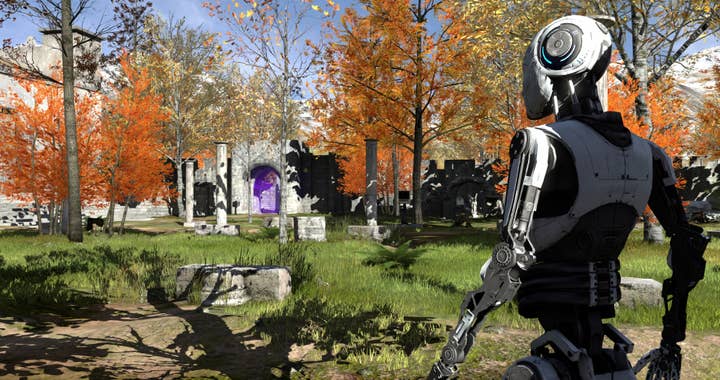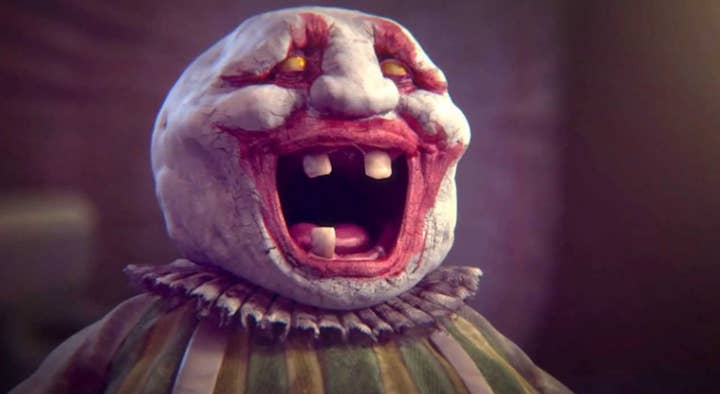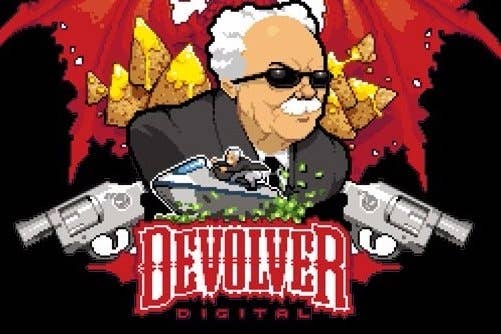"Every year has been better than the last. Thriving is the best way to put it."
Devolver Digital and the myth of the Indiepocalypse
"When I first heard it mentioned, I actually thought it was a game that Vlambeer were making," Graeme Struthers laughs when I ask him if he's seen any signs of the apparently impending 'indiepocalypse'. "I've been hassling JW (Jan Willem Nijman) for a build and he's not come through with one yet. So...no. We haven't seen any sign of it. But I do hope it is a game that JW is making, I'd like to see that..."
I'm sat at a table with Struthers and Devolver co-founder Harry Miller, as fellow founding father Mike Wilson flits to and fro between us and the rest of the 'art bunker' venue we're ensconced in beneath San Francisco. On the other side of the room, people flail around in VR helmets and jostle amongst the cabinets showcasing Devolver's current slate. It's a bustling, happy atmosphere full of devs and journalists, despite being five blocks from the main GDC show floor at the Moscone Center. It's somewhere around midday, so obviously we're all having a beer.
This is exactly how Devolver works, a distinct lack of formality and corporate attitude which runs through everything the company does. It's there in their developer relations, the interactions with the press, the games themselves. But it's not just a hipsterish, too-cool for school façade, and it's most definitely not a lack of professionalism. Devolver gets stuff done, and done well.
"Every year has been better than the last, and that continues to be the case," says Struthers when I ask him about the last year. "Thriving is, I think, the best way to put it. Life is good. Very good."
It's been a year of experiments, as have most in the publisher's short history. October saw the first ever mobile-led release for the company, the brutal and minimalistic Downwell, a game which is pure Devolver. Securing a 91 per cent Metacritic on iOS and generous handfuls of awards, it's a pretty decent first foray into mobile-first development, so I ask Struthers if there's an ongoing plan to diversify the company's slate.
"I don't think we ever look at it from the perspective of diversifying, whether that's Downwell, Talos or Shadow Warrior, we just do what we're interested in"
"It's always interesting to hear other people's views of us in that respect, because I don't think we ever look at it from the perspective of diversifying, whether that's Downwell, Talos or Shadow Warrior, we just do what we're interested in.
"There's no really strategy at play here," he adds with a smile.
Miller agrees, but points out that Downwell does represent new territory.
"But we tend to get pigeon-holed as a pixel publisher, right, forgetting the fact that we started with Serious Sam. But I agree, there was big change in signing a game that was mobile first. We've never done that before - it's always been PC focus, then maybe you have console, then possibly some mobile elements. But leading on mobile? That's a first."
"We've actually got a couple of other projects lined up for mobile," says Struthers. "I think to some degree it's all about gaining confidence, a good game is a good game whether it's on PC, mobile or PlayStation 4. We're not involved in that world of free or in-app purchases, if someone is buying something from us, it's to own it.
"I was very sceptical about getting involved in [mobile] that world, because so many people had told me it was pointless unless you were using that kind of model, using free-to-play. Turns out there's actually a thriving marketplace for people who are willing to pay up front. The message seems to be that if you make a decent game, people will pay for it."

"But it's tough, it's a highly competitive market," admits Miller. "Although we complain about free-to-play, it's a really thriving market, a lot of people really enjoy it. When I speak to my kids about these games they ask 'are you charging for it?' When I told them it would be $2.99 or whatever they said, 'oh, we'll show it to our friends, but nobody will buy it.'"
One of the things which always strikes me about the Devolver team is how small it is. Just six people doing almost everything on a day-to-day basis. How do you run a company with such broad reach with so few human resources? Surely increasing success must at some point require a bigger headcount? Miller disagrees.
"I don't know if we're getting bigger actually. We have six full time staff, then we have additional support for shows, streaming, trailers... Our growth probably won't be through more games, either, but by being more selective."
Nonetheless, Struthers admits that the company profile is growing, alongside its reputation.
"Yeah, we've seen the benefit," he says. "Something like the Talos Principle comes out and people see Croteam making such a seachange in direction and they make a game which blows people away, wins awards left and right, and we get the Halo effect, it comes in our direction." Another grin. "Also, we always take as much credit as we can."
"When I speak to my kids about these games they ask 'are you charging for it?' When I told them it would be $2.99 or whatever they said, 'oh, we'll show it to our friends, but nobody will buy it"
"Didn't you design Talos?" quips Miller.
"I feel like I did, yeah. I certainly wrote a lot of it."
It's testament to Devolver's relationship with its developers that the pair can make jokes like this on the record. Everyone I've met from the Croatian developer is full of praise for their publisher, and the two companies have formed a long-standing and mutually beneficial relationship. Struthers says that repeat business is at the heart of what they do, even if the teams they work with can sometime be a little fluid.
"The team behind Shadow Warrior, we're on our second project with them, Croteam...it's been I don't know how many years. It pre-dates Devolver, goes back to Harry and Mike working with them on the very first Sam. Equally, some of the people we work with don't really know what they're going to do next themselves. They finish a game and maybe take a hiatus. We've noticed a bit of a trend in that they tend to go off and do game jams, maybe work with other developers for a bit. They're not really fixed units.
"But by and large, we're really lucky. They tend to come back and give us a chance to work with them again.
"But even with Downwell, that was a game that people really responded to. Then we get the benefit of that, we become part of that sentence. So we're in a lovely position where the games are good and we get a nice little reputation bump. So that's great.

"I like to think we're very accessible, too. That people can get involved and talk to the developers without any interference, so there's probably quite a high level of awareness of the games because the developers are so available. In the world of media there's often people between you guys and the people actually making the games. With us, there's no one."
This year GDC, and the games industry in general, has been almost entirely dominated by VR, but there's also been a theme of emergent distribution platforms. I've spoken to five companies over the course of the week who are distributing games on every basis from streaming, to in-browser VR to more traditional code-retail. In truth, it's unlikely that any of them is ever going to be a serious thorn in the side to the behemoth of Steam, but does Devolver see a future in working with them?
"Steam really is our key platform and I don't see that changing," says Struthers. "It's the best place for a lot of the things we do. Every time we talk about it we all say the same thing: they're just wonderful to work with, they're so pleasant as well as being very good at what they do. Very decent human beings.
"In terms of other platforms, they're out there but we haven't seen anyone, perhaps outside of GoG and Humble, who seems to have a coherent plan for how they're going to build a base of customers and give them good reasons to buy for them. The resale market is shit, more and more of those people are disappearing, and it's not because they're not trying hard, it's about consumers deciding where they want to buy.
"Good places build community, everyone else has been a sort of race to the bottom"
"I think the reason that some platforms are thriving is that they've built up a very loyal community who want to be there. I don't see that happening in many other places, I don't see that shifting. GoG are great, they've got some new plans emerging. Steam continues to iterate. Even Sony and Microsoft are trying to improve what they do. Nintendo, also.
"Good places build community, everyone else has been a sort of race to the bottom."
Mike Wilson, a man with an industry CV as long as your arm, chips in from the end of the table. He's animated and intense, but simultaneously laid back, a cheery zoetrope of a man.
"Steam has a real advantage in that they've been at it so long and they're a private company, so there's no external forces to start putting the screws to people. That's tough to compete with, especially if you are a public company. You're forced to keep growing, no matter how well things are going, and that's when decisions start getting made for less pure reasons. It's almost not a fair fight.
"We're not in favour of a monopoly. If there are more people doing a good job, that's great, so we used to give people the benefit of the doubt. We stopped doing that so quickly because nine times out of ten it wasn't good business."
He's gone before I can ask him to expand on it, but I suspect that there's no trash talk to follow anyway. Devolver's executives might be unconventional, but they're not ones to do their laundry in public. Nonetheless, it's always worth trying to stir the pot a little, so I bring up the subject of the grey market, reselling PC codes bought in cheaper territories to customers in North American and Europe. It's a practice which constantly skirts on the illegal, one which could do serious damage to companies like Devolver and its developers. Struthers shows restraint.

"Everyone has to make their own decisions on how to do stuff, but a lot of key resellers have unwittingly become the source for that grey market because they don't have the right security in place," he says with a sigh. "They end up being victims of things like credit card fraud - keys which then end up in the marketplace. We've looked at every step we've made - we tried to support everyone, but we've had to take a step back from that. And that's a shame, because they're not bad companies, they're not bad people doing things which are intrinsically wrong, they're just not prepared to put the measures in place to deal with that sort of threat.
"The thing with what companies like G2A do, is that it's essentially legal. They don't have to invest any of their time to ascertain whether what's being sold through their system is legal, stolen or legit. They don't have to care. But I would suggest that perhaps, as we're all invested in the same industry, people who take their advertising dollars might think about why they're doing that and perhaps decline that opportunity. But it isn't going to go away, and also some people have really helped to create the issue by not being careful about where they sell their games.
"We believe that the gamer should be secure in knowing that what they buy is legit and that the developer should be rewarded for that purchase. The two things lead to developers being more able to continue making games. So avoiding people who remove either of those elements makes sense to us."

